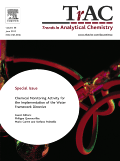
TRAC-TRENDS IN ANALYTICAL CHEMISTRY
Scope & Guideline
Diving Deep into the Latest Methodologies and Technologies
Introduction
Aims and Scopes
- Advanced Analytical Techniques:
The journal covers cutting-edge methodologies in analytical chemistry, including mass spectrometry, chromatography, and electrochemical sensing, facilitating the detection and quantification of various compounds in complex matrices. - Nanotechnology Applications:
A significant emphasis is placed on the utilization of nanomaterials and nanotechnology in sensor development, biosensing, and environmental monitoring, showcasing the role of nanoscale materials in enhancing sensitivity and selectivity. - Environmental and Food Safety Analysis:
The journal discusses analytical methods for detecting pollutants, contaminants, and emerging chemicals in environmental samples and food products, highlighting the importance of sustainability and safety in analytical practices. - Biochemical and Biomedical Applications:
Research focusing on biosensors and diagnostic tools for medical applications, particularly in disease detection and monitoring, is a core area, underscoring the intersection of analytical chemistry with health sciences. - Green Analytical Chemistry:
TRAC emphasizes sustainable practices in analytical methodologies, promoting the development and implementation of green solvents, eco-friendly extraction techniques, and overall greenness in analytical processes. - Artificial Intelligence in Analysis:
The incorporation of AI and machine learning techniques in data analysis and interpretation in analytical chemistry is a growing focus, facilitating advancements in precision and efficiency in research.
Trending and Emerging
- Microfluidics and Lab-on-a-Chip Technologies:
Research focusing on microfluidic devices and lab-on-a-chip technologies is on the rise, emphasizing their potential for rapid, portable, and efficient analysis in various applications, including diagnostics and environmental monitoring. - Biosensors and Point-of-Care Diagnostics:
There is a growing trend in developing advanced biosensors and point-of-care diagnostic tools, particularly for infectious diseases and chronic conditions, highlighting the demand for rapid and accurate testing methods. - Integration of AI and Data Analytics:
The application of artificial intelligence and advanced data analytics in analytical chemistry is increasingly prominent, facilitating improved data interpretation, predictive modeling, and automation in analytical processes. - Sustainability and Green Chemistry:
Emerging themes emphasize sustainable practices in analytical methodologies, with a focus on green solvents and environmentally friendly extraction techniques, aligning with global sustainability goals. - Nanomaterials in Sensing and Detection:
The use of nanomaterials for enhancing the performance of sensors and detection systems is rapidly gaining attention, showcasing their ability to improve sensitivity and specificity in various analytical applications. - Metabolomics and Exposomics:
Research in metabolomics and exposomics is expanding, driven by the need to understand complex biological systems and their interactions with environmental factors, facilitating advancements in health and environmental sciences.
Declining or Waning
- Traditional Chromatography Techniques:
There is a noticeable decline in papers focusing on conventional chromatography methods without innovative enhancements or applications, as researchers increasingly explore advanced and hybrid techniques. - Basic Analytical Methods without Integration:
Publications dedicated to fundamental analytical methods devoid of integration with modern technologies or interdisciplinary approaches are becoming less frequent, suggesting a shift toward more complex and integrated methodologies. - Focus on Inorganic Analysis:
Research centered solely on inorganic analysis is decreasing in favor of more comprehensive studies that incorporate organic and biochemical aspects, reflecting a broader scope of analytical chemistry. - Static Analytical Techniques:
Static or one-dimensional approaches to analytical chemistry are being overshadowed by dynamic and multi-dimensional techniques that provide more comprehensive insights into sample analysis.
Similar Journals
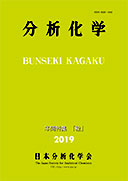
BUNSEKI KAGAKU
Connecting Researchers Through Quality ScholarshipBUNSEKI KAGAKU, published by the Japan Society Analytical Chemistry, is a reputable journal dedicated to the field of analytical chemistry. With an ISSN of 0525-1931, this journal has been a crucial outlet for scholarly communication since its inception in 1952, converging its publication years from 1954 to 1957 and from 1959 to 2024. Although it holds a Q4 category ranking in the most recent 2023 quartiles of analytical chemistry and ranks 153/156 in Scopus, it continues to serve as a platform for quality research, fostering advancements in the field. BUNSEKI KAGAKU is based in Tokyo, Japan, and emphasizes the critical importance of analytical techniques in scientific inquiry. With a commitment to professionalism and rigor, the journal provides a vital resource for researchers, students, and professionals seeking to explore innovative methodologies and contribute to the ongoing dialogue in analytical chemistry.

Biosensors-Basel
Advancing biosensor innovation for a healthier tomorrow.Biosensors-Basel is a premier Open Access journal, published by MDPI since 2011, dedicated to advancing the field of biosensors and related technologies. With its academic headquarters in Basel, Switzerland, the journal serves as a vital resource for researchers, professionals, and students across various disciplines, including Analytical Chemistry, Biomedical Engineering, Biotechnology, and Clinical Biochemistry. Boasting an impressive range of quartile rankings—such as Q1 in Instrumentation and Q2 across several other categories—Biosensors-Basel is recognized for its high-impact research and significant contributions to the scientific community, evidenced by Scopus rankings that place it among the top journals in its field. The journal's open-access model ensures that cutting-edge findings are accessible to a global audience, promoting collaboration and innovation in biosensor technology and its applications. Scholars and professionals looking to stay on the forefront of this dynamic field will find Biosensors-Basel an indispensable platform for sharing knowledge and fostering advancements.

Chemosensors
Empowering Science through Open Access ResearchChemosensors is a distinguished open-access journal published by MDPI, focusing on the innovative field of analytical chemistry and physical and theoretical chemistry. Since its inception in 2013, the journal has rapidly established itself as a pivotal platform for the dissemination of cutting-edge research related to the development and application of chemical sensors, encompassing various methodologies and technologies that contribute to advancements in diagnostics, environmental monitoring, and industrial applications. Based in Switzerland, the journal operates with a commitment to accessibility, ensuring that all published articles are freely available to a global readership. With a current impact factor that positions it in the Q2 quartile for both Analytical Chemistry and Physical and Theoretical Chemistry, Chemosensors attracts a diverse audience of researchers, professionals, and students eager to explore new findings and foster collaborative efforts in sensor technology and its applications. As it continues to grow, Chemosensors remains devoted to advancing scientific knowledge and innovation in its field, making significant contributions to the global scientific community through its rigorous peer-review process.

TALANTA
Elevating Standards in Analytical MethodologiesTALANTA, published by Elsevier, is a premier international journal that serves as a vital platform in the field of analytical chemistry. Since its inception in 1958, TALANTA has provided a comprehensive forum for the dissemination of groundbreaking research and developments in chemical analysis, spanning a wide array of topics including biochemistry and spectroscopy. With an impressive impact factor and ranking in the Q1 quartile within its category for 2023, it is ranked #12 out of 156 journals in Analytical Chemistry by Scopus, placing it among the most influential journals in its field. Researchers, professionals, and students benefit from its stringent peer-review process and high-quality content that drives advancements in analytical methodologies and applications. TALANTA's commitment to fostering innovation and excellence in research makes it an indispensable resource for anyone at the forefront of scientific inquiry.

Moscow University Chemistry Bulletin
Igniting Passion for Chemistry, One Article at a TimeMoscow University Chemistry Bulletin is a distinguished academic journal dedicated to advancing the field of chemistry, published by PLEIADES PUBLISHING INC. With an ISSN of 0027-1314 and an E-ISSN of 1935-0260, this journal provides a platform for researchers, professionals, and students to explore a wide range of topics in general and specialized chemistry. While it holds a current Q4 ranking in the “Chemistry (miscellaneous)” category according to Scopus, the journal is committed to broadening its scope and visibility, aiming for greater impact in the global scientific community. Moscow University Chemistry Bulletin focuses on the publication of cutting-edge research, reviews, and discussions that stimulate innovation and collaboration. Although it is not an Open Access journal, it plays a crucial role in disseminating knowledge and fostering academic dialogue within the field, as it converges towards significant findings from 2004 to 2024. The continuous development of its content holds the potential to attract a diverse readership, making it a valuable resource for those involved in the chemical sciences.
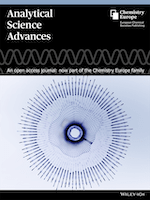
Analytical Science Advances
Pioneering Research for Tomorrow's Analytical ChallengesAnalytical Science Advances is a dynamic journal published by WILEY, dedicated to the ever-evolving field of analytical chemistry. With an ISSN of 2628-5452, this open-access platform aims to disseminate high-quality research and insightful reviews that push the boundaries of analytical methodologies and instrumentation. Since its inception in 2020, the journal has gained traction, securing a commendable Q2 ranking in 2023 within its category, highlighting its significance in the scientific community. Currently positioned at Rank #68 out of 156 in Scopus' analytical chemistry category, it boasts a 56th percentile ranking, reflecting its contributions to advancing analytical techniques. Researchers, professionals, and students will find this journal an invaluable resource for keeping abreast of the latest developments, emerging technologies, and innovative approaches in analytical science, ensuring the journal's relevancy and influence in shaping future discoveries.

Analytical and Bioanalytical Chemistry Research
Pioneering Insights in Bioanalytical Research.Analytical and Bioanalytical Chemistry Research is an esteemed open-access journal published by the Iranian Chemical Society, dedicated to the advancement of knowledge in the fields of analytical chemistry, biochemistry, and spectroscopy. Since its inception in 2014, this journal has provided a platform for researchers, professionals, and students to publish and access high-quality research articles that contribute to the understanding of chemical analysis and bioanalytical methods. With an ISSN of 2383-093X and an open-access model that promotes global dissemination of findings, it ensures that innovative research reaches a broad audience. The journal has consolidated its presence in the scientific community, currently ranked in quartile Q4 for analytical chemistry, biochemistry, and spectroscopy as of 2023. Its Scopus rankings, including a percentile of 34th in Analytical Chemistry, reflect its commitment to quality research and scholarly contribution. Situated in Tehran, Iran, the journal serves as a vital resource for academic discourse, offering insights into emerging trends and methodologies in analytical and bioanalytical chemistry.
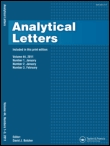
ANALYTICAL LETTERS
Unveiling Breakthroughs in Clinical BiochemistryANALYTICAL LETTERS is a reputable journal published by Taylor & Francis Inc, focusing on the dynamic fields of analytical chemistry, biochemistry, and clinical biochemistry. With an ISSN of 0003-2719 and an E-ISSN of 1532-236X, the journal has been a platform for scholarly articles since its inception in 1967, and is set to continue its contribution to the scientific community until 2024. Despite its classification in Q3 across various categories as of 2023, including analytical chemistry and spectroscopy, ANALYTICAL LETTERS maintains a significant impact within its field, evidenced by its moderate rankings within Scopus. This journal serves as a vital resource for researchers and professionals seeking to explore recent advancements in analytical methodologies, instrumentation, and applications, facilitating the dissemination of critical insights in laboratory practices. With access primarily through institutional subscriptions, it remains positioned as a crucial tool for those advancing knowledge and innovation in analytical sciences.
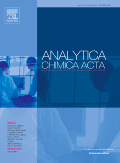
Analytica Chimica Acta
Empowering discoveries through innovative research.Analytica Chimica Acta is a prestigious peer-reviewed journal published by ELSEVIER, renowned for its significant contribution to the fields of analytical chemistry, biochemistry, environmental chemistry, and spectroscopy. Established in 1947, this journal has solidified its reputation, reflected in its impressive impact factors and Scopus rankings, including a Q1 classification in Analytical Chemistry and Spectroscopy, and a Q2 ranking in both Biochemistry and Environmental Chemistry. With its comprehensive scope, Analytica Chimica Acta aims to publish innovative research, critical reviews, and technical notes that advance the understanding and application of analytical methods. As an essential resource for researchers, professionals, and students alike, it encourages the dissemination of high-quality research that addresses contemporary challenges in chemical analysis and promotes interdisciplinary collaboration. While the journal operates primarily on a subscription basis, it also offers unique opportunities for authors to reach a broad audience and engage in the global scientific discourse.
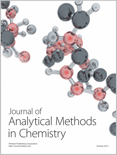
Journal of Analytical Methods in Chemistry
Pioneering research in the realm of analytical chemistry.The Journal of Analytical Methods in Chemistry, published by HINDAWI LTD, stands as a premier platform dedicated to the dissemination of research in the vibrant field of analytical chemistry. With an ISSN of 2090-8865 and an E-ISSN of 2090-8873, this Open Access journal has been committed to providing unrestricted access to quality research since 1978, thereby fostering greater collaboration and innovation among researchers, professionals, and students globally. The journal showcases rigorous research insights spanning diverse categories, earning impressive Scopus rankings including Q2 in Chemical Engineering and Q3 in Analytical Chemistry for 2023, positioning itself effectively among respected peers. Its interdisciplinary approach also covers significant contributions in the realms of instrumentation and computer science applications, thus addressing contemporary challenges and advancements in analytical methodologies. By bridging theoretical underpinnings with practical applications, the Journal of Analytical Methods in Chemistry aims to catalyze knowledge exchange while enhancing the global discourse in analytical science.